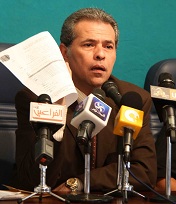CAIRO: It’s been a turbulent week in Egypt for ministers, dissidents, presidents and their sons.
In fact the turbulence had started last week with the shocking theft of Van Gogh’s “Poppy Flowers” from Cairo’s Mahmoud Khalil Museum. But the spill over from the hassle-free heist where the thief used a simple box-cutter to remove the masterpiece from its frame, then simply walked out, has not subsided.
A war of words, accusations and counter accusations ensued between Mohsen Shaalan, deputy minister and head of the Fine Arts section who is now being held in custody pending investigation into charges of negligence, and Culture Minister Farouk Hosni, have been making headlines all week.
While Hosni alleges that he had no idea that only seven of the museum’s 43 surveillance cameras were functioning and that none of the alarms worked, Shaalan cried “conspiracy” as he claimed Hosni has known since 2007 and that he was a scapegoat.
It’s hard not to sympathize with the poor minister-artist who told Al-Ahram Weekly that he was “increasingly frustrated” by incompetent employees and that he is “tired” and wakes up “in the middle of the night fearing for the artefacts in Egypt’s museums,” several of which were ordered shut after the media revealed more scandals involving lax security and dysfunctional surveillance systems guarding Egypt’s national treasures.
Hosni has also publicly regretted taking on the culture ministry almost 24 years ago, telling the state-run egynews.net that had he known what the future held, he would have seriously reconsidered the offer.
It seems that this is as good a chance as any to correct his mistake. It’s not every day that a $55 million painting is stolen under your watch, Mr. Minister.
And speaking of setting records straight, so-called pro-democracy and staunch anti-inheritance of power advocate Saad Eddine Ibrahim was the subject of another scandal when he shocked reformists everywhere when news emerged that he had endorsed a campaign supporting son of the president Gamal Mubarak for president in 2011.
“I signed (the petition) to support his right as a citizen to run, but I don’t endorse him,” Ibrahim said in a brief comment to the Associated Press last Monday while getting ready to board a flight to the United States, of which he is a citizen.
The reaction to his move was vicious, with observers and activists like Hassan Nafaa, coordinator of an opposition movement which is backing the nomination of Mohamed ElBaradei, contending that Ibrahim “either lost his mind or there is a deal with the ruling regime”.
On the other hand, Magdy El-Kurdy, coordinator of the “Popular Coalition to Support Gamal Mubarak for Presidential Elections” (incidentally a former member of one of Egypt’s oldest leftist opposition parties) has hailed Ibrahim’s decision to sign the petition as “a positive change in his position toward Gamal”.
Although Ibrahim denied endorsing Gamal Mubarak, it’s hard to imagine that someone like him can be duped into signing such a document. His claims that El-Kurdy deliberately misled him and the media have fallen on deaf ears. It seems that the constant disillusionment with Egypt’s fragmented and flimsy opposition can only get worse when icons like Ibrahim start selling out.
On the subject of campaigns and succession, President Mubarak’s decision to invite his son Gamal to accompany him to Washington for the launch of direct talks between Israel and the Palestinian Authority — where he is even expected to meet Israeli delegates — has not only re-fuelled fears of an inheritance scenario, but has rendered it a fait accompli even among skeptics.
One expert told this newspaper that taking Gamal along in this high-profile foreign affairs event proves that “President Mubarak has made his decision and this is part of the campaign to groom him [Gamal] for succession”.
Yet all does not seem quiet on the NDP front, with apparent divisions beginning to appear within the ruling party. Just days before the Washington trip, leading National Democratic Party figure Safwat El-Sherif announced that he supports the incumbent for the 2011 presidential elections, in clear conflict with the implications of the President’s decision to involve Gamal in the peace process.
Another symptom of a renewed crackdown on anti-Gamal Mubarak sentiment was a decision Thursday night to ban publication of story about a new campaign for the 2011 elections, this time supporting Egypt’s Intelligence chief Omar Suleiman. Daily News Egypt sources have confirmed that state security has either ordered the story be pulled from all Friday editions if they had not yet been printed (the case with Daily News Egypt) or has confiscated copies — some claim to the tune of 50,000 — that had already been printed.
This renewed vigor in suppressing anti-Gamal sentiments, or indeed sentiments supporting anyone else, is disconcerting. Strange enough, coverage of Al-Ghad party leader Ayman Nour’s counter campaign against the coalition to support Gamal, received almost no attention from either state security or the censors.
It’s only a matter of time before we can connect the dots and the picture will be complete.
But one thing’s for sure: Gamal Mubarak is here to stay, and there’s nothing anybody can do about it.
Rania Al Malky is the Chief Editor of Daily New Egypt.

